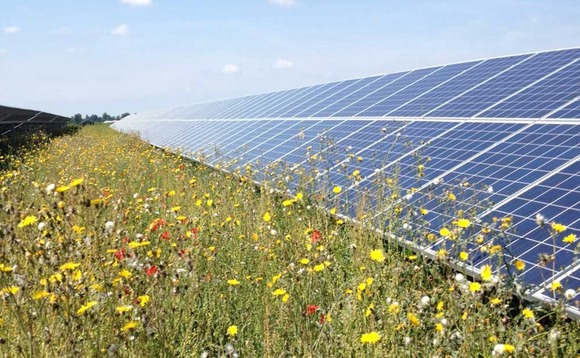Report from MPs and peers argues that unless government devolves significant powers and cash to a local level, national climate targets will not be met
Local authorities will have to take a more central role in delivering green projects such as clean energy infrastructure and improved public transport if the UK is to meet its overarching target of net zero emissions by 2050.
That is the conclusion of a new report published yesterday by the all-party parliamentary group (APPG) on a New Green Deal, which is co-chaired by Green MP Caroline Lucas and Labour MP Clive Lewis.
Titled Local Edge: An Inquiry Into Climate Politics and The Economics of Recovery, the report argues that there is an urgent need to deliver emission reduction solutions at a local level in three crucial areas: heat energy and buildings; food, land use, and nature; and transport and air quality.
It warns the government is currently off track to meet its near-term emissions goals, which were submitted to the UN through the UK's Nationally Determined Contribution (NDC) and require emissions to be cut to 68 per cent below 1990 levels by 2030. While the government has bold medium and long term emissions goals in place for 2035 and 2050, the report argues that meeting the NDC's 2030 targets represents the "most immediate challenge" and warns it will be "impossible" to reach unless Ministers devolve significant powers and resources to a local level.
"If we're going to meet our immediate climate targets and secure a liveable future - with warm and comfortable homes, renewable and affordable local energy, healthy and low-carbon food, and cheap and clean transport - we urgently need to put Green New Deal policies into practice, with local people and communities at the forefront," said Caroline Lucas, the Green Party MP for Brighton Pavilion.
"We know that every home can be its own power station," she added. "But now we need national government to power up communities with the finance, resources and regulatory frameworks to help them scale up and thrive."
Evidence sessions held by the inquiry found that there were examples of transformative local initiatives around the country, but that the local communities involved were ultimately held back by not having the necessary national regulatory frameworks and finance to scale them up properly.
The report found the most effective local climate projects followed a pattern where national governments set out statutory climate obligations, but allowed local authorities to determine how best to deliver them.
"The greenest shoots of the economic transition demanded by the climate emergency are found in the transformatory and locally-led initiatives we see up and down the UK," said Clive Lewis, Labour MP for Norwich South. "This local leadership should be taken as a national cause for hope, offering a roadmap for how to implement a Green New Deal and meet 2030 climate targets in a way that empowers local communities and embraces a diversity of approaches. Central Government needs to step up and let local people lead, by equitably distributing resources and decentralising decision-making power."
The report suggested that one such transformative proposal would be for the government to make its commitment to a 68 per cent reduction in carbon emissions on 1990 levels by 2030 a binding obligation on all public sector organisations and agencies for all their spending, programmes and projects.
The report also called for what it described as a 'European-style right of local supply', which it argued could promote the development of more localised energy communities through a series of initiatives such as by allowing community renewables generation schemes to sell directly to local people; changes to grid access charging to make it easier for local energy systems to be developed; and a restoration of energy efficiency funding to at least 2012 levels
In addition, the authors of the report called for an end to tax allowances for the use of fossil fuel vehicles. It said lessons can be learned from a number of cities, such as Manchester where it suggested that conflicts between communities and commuters can be minimised when integrated and affordable public transport alternatives are provided.
Some of the APPG's other recommendations include the suggestion all planning law must be aligned with net zero climate targets and that net zero goals should be specifically included in all local plans.
It also suggested that local authorities should be given a statutory duty to cut transport emissions in their area by 68 per cent by 2030 and that the duty to deliver integrated public transport services should be returned to local authorities.
In addition, the ECO energy efficiency programme should be replaced with a revised version of the Warm Zones scheme, the APPG argued, proposing that whole-area - rather than individual household - approaches to energy conservation should be adopted so as to reduce costs and maximise return on investment for taxpayers.
It highlighted how in Scotland the Warm Works programme is retrofitting 30,000 fuel-poor homes over a seven year contract period, centralising upgrade standards and enabling a shift from gas boilers to heat pumps. For contractors, the long term contract provides the certainty needed to enable investment in planning, training, and new technologies. The report argues the approach should be replicated more widely and local authorities should be given the power to make heat pumps the default requirement for boiler-replacement schemes so as to deliver rapid carbon reductions and accelerate the creation of new skills and jobs in a low carbon economy.
The APPG also recommended that all carbon subsidies, including for fertilisers and fuel, must be replaced with support for regenerative and organic farming practices and that a new Local Food Investment Fund should be established to provide strategic support across the UK for investment in localised agri-food infrastructure and enterprise.
In light of what APPG described as the UK's over-centralised approach to energy generation, storage and distribution, it also made a number of specific recommendations to energy regulator Ofgem.
These included calls for Ofgem to open its Innovation Funding to promote more localised combined heat and power systems; switch to an average cost pricing system which favours more localised and lower cost renewables; and prioritise the lowest carbon and marginal cost supplies in a bid to end the current situation in which wind turbines can be stood down to keep power stations running.
The APPG said that evidence submitted to the enquiry - including from witnesses such as Greater Manchester Mayor Andy Burnham and West Yorkshire Mayor Tracy Brabin - "unlocked a rich stream of ideas about how the UK can meet its 2030 carbon reduction commitments and rebuild its economy along more sustainable and inclusive lines".
Overall, it argued that while witnesses were confident that the UK can meet its 2030 emissions target, it can not do this without local government becoming much more central to the process.
"The government must make its commitment to 68 per cent reduction in carbon emissions on 1990 levels by 2030 binding on all public sector organisations and agencies in relation to spending, programmes and projects, with a regular reporting requirement," the report concluded.
It stressed that this will require radical decentralisation of delivery mechanisms, which it argued would in effect create a Green New Deal with localities and local communities locked into the heart of it.
The report is the latest in a string of calls for the government to provide cities and local authorities with more funding and powers to help them deliver on their climate goals. It came on the same day as a separate study warned that more funding was urgently needed to improve the energy efficiency of public buildings, with researchers concluding that at the current rate of improvement it will take over a century for the government to meet its energy saving goals.
Similarly, yesterday saw a group of more than 1,000 oil and gas workers in north east England and Scotland join forces with unions and green groups to warn the industry is failing to deliver its promised green energy transition.
The group warned that despite industry wide commitments to deliver net zero emissions the sector as a whole was failing to mobilise sufficient investment in the green transition, with 73 per cent of oil and gas companies found to be investing nothing in renewable energy.
The workers have allied with unions including RMT, GMB, and Unite, as well as green groups Platform, Uplight, and Friends of the Earth to argue that the transition away from fossil fuels is essential to protect their jobs, communities, and the climate.
The resulting energy energy sector transition plan, titled Our Power, calls on the government to ramp up investment in renewables manufacturing hubs in the UK, ensure polluting companies pay for the de-commissioning of oil rigs, introduce a permanent Energy Excess Profits Tax, and enable greater public ownership of energy companies.
"Our current energy system is destroying our climate, is unaffordable to millions and is failing the people who work in it," said Friends of the Earth Scotland head of campaigns, Mary Church.
"Climate science is crystal clear that we have to rapidly phase out fossil fuels if we want a liveable future. Failure from politicians to properly plan and support the transition to renewables is leaving workers totally adrift on the whims of oil and gas companies, and the planet to burn."








